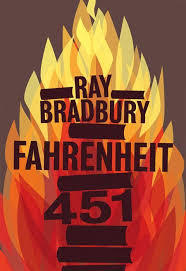 2017: 28
2017: 28
3.5 of 5 stars
Published October 1953
Fahrenheit 451 was published in the early 1950s during the early days of the Cold War and the McCarthy era where potential Communists were targeted. Bradbury took a look at the present and foresaw a future where society was oppressed and locked down. Even in the 1950s there were book burning threats and censorship which hasn’t really gone away, with books being banned from schools and libraries even today.
At the time, he thought the rise of mass media was minimizing interest in reading and today, that’s even more relevant when people spend so much time watching movies and television, streaming video, and communicating in short sentences, brief video clips and photos of their everyday lives.
This is the story, set in the future (post-1960, remember, it was written in the early 1950s) of Guy Montag. He lives with his wife. He burns books for a living because books are now illegal. Firemen of the future will not prevent fires since houses and buildings are fireproofed, instead, they start them, seeking out places where people have hidden illegal books. Guy’s wife is detached and absorbed into the world of media, blasted out from flat screened walls in the living rooms of their house. He meets a young neighbour whose interests are old fashioned and who is shunned by her fellow students. Oddly enough, she disappears and Montag later finds out she was hit by a car and killed. I’m not sure if it’s hinted that there was a sinister reason behind this or not.
The turning point for him is the day where a woman refuses to leave her home when the firemen are trying to burn the house filled with books. She lights the fire herself and commits suicide. That affects Montag deeply. We discover he is not happy and has been curious about books, wondering if there might be something in them that could make a difference to his life. He has been pilfering them from the fires and hiding them. We then find out from his boss how books came to be illegal: People began to lose interest with the onset of various types of new media, and little by little, the attention span of the general public shortened, books became abridged more and more until they were next to irrelevant. The government cashed in on the apathy towards books and began burning them, leading to new laws making them illegal altogether.
He connects with a former university professor who attempts to help him but when he impulsively reveals his books to his wife and her friends, they report him. He has to burn his own house but things get out of control and he ends up a fugitive. There are people living “off the grid” that help him. People who still believe in books. The final message of the book is surrounded in the legend of the phoenix, a creature that is destroyed in flames and is reborn over and over. Perhaps mankind can learn from their mistakes rather than self destructing repeatedly. The destruction at the end of the book might lead to a new rising and a lesson learned the next time around. We can only hope.
While censorship doesn’t seem to be prevalent these days, I feel sometimes it’s just under the surface. There are still governments in the world that are oppressive and some that seem like they could go either way if left to their own devices. People are so involved in the online world, social media and the like. Books are still popular but not as much as they were. Travel bans, rules, restrictions are all becoming more and more common. Newspapers are selling less as people turn to television and the internet for headlines. What Bradbury saw from the perspective of the 1950s doesn’t seem all that different to what could happen now. The fears he had are still relevant. We may not turn into a society that burns books or kills people for thought crimes (1984), but if we’re not careful, things might not be so very different in another generation or three.

 In the next round, everyone was asked which of the two books was the best written. (and I’m paraphrasing the speakers here)
In the next round, everyone was asked which of the two books was the best written. (and I’m paraphrasing the speakers here) Fifteen Dogs wears the crown.
Fifteen Dogs wears the crown.

 It’s time to vote.
It’s time to vote.